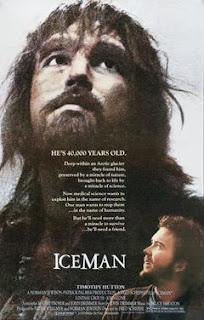
The opening scenes of Fred Schepisi’s Iceman feel as if they were lifted from John Carpenter’s The Thing. Something has been found in the ice, and is flown be helicopter back to an arctic base, where a team of wise-ass researchers banter back and forth, trying to determine exactly what it is they’ve uncovered.
According to anthropologist Stanley Shepherd (Timothy Hutton), it’s a neanderthal man, frozen some 40,000 years ago. While running tests to see if any of his cells survived the freezing process, Dr. Diane Brady (Lindsey Crouse) and her team, including Whitman (Josef Sommer), Dr. Vermeil (Philip Akin), Loomis (Danny Glover), and surgeon Singe (David Straithaim), make a startling discovery: this neanderthal (played by John Lone) is not only a perfect specimen, but can actually be revived!
Placed in a habitat so they can study his behavior, the prehistoric man eventually realizes his situation, at which point Shepherd, who nicknamed the neanderthal “Charlie”, attempts to communicate with him. But how long will Shepherd and the others have access to Charlie before medical science gets its hands on him?
There are a number of well-directed, perfectly paced sequences scattered throughout Iceman. The initial thawing, which brings us to the edge of our seats, is immediately followed by another exciting scene, when the amazed researchers actually bring their subject back to life. Another great sequence occurs late in the film, when Charlie, left unsupervised, makes his way out of the habitat and into the research facility. Schepisi expertly directs his entire walk, during which Charlie encounters everything from a mirror to automatic sliding doors.
Filling the gap nicely between these “big” scenes are Shepherd’s efforts to communicate with the very confused Charlie, with Hutton turning in a fine performance as the scientist who takes a personal interest in his subject’s well-being.
Standing above all else, though, is John Lone as Charlie; he is jaw-droppingly amazing! Even when we don’t understand Charlie’s guttural grunts, we can see, in Lone’s eyes, exactly what he is feeling. The actor perfectly conveys his character’s every thought and emotion, even the primitive ones, and it’s watching Lone’s performance that makes Iceman such an engaging motion picture.
The film does stagger a bit when it comes to revealing what will happen to Charlie once he leaves the habitat. Will he be subjected to experiments? Will he be dissected? Will they find him an apartment in Anchorage and help him land a job? It’s never really explained. But in a movie as strong as Iceman, this is a minor quibble, and watching Schepisi and Lone do their thing is alone worth the price of admission.
Rating: 9 out of 10
